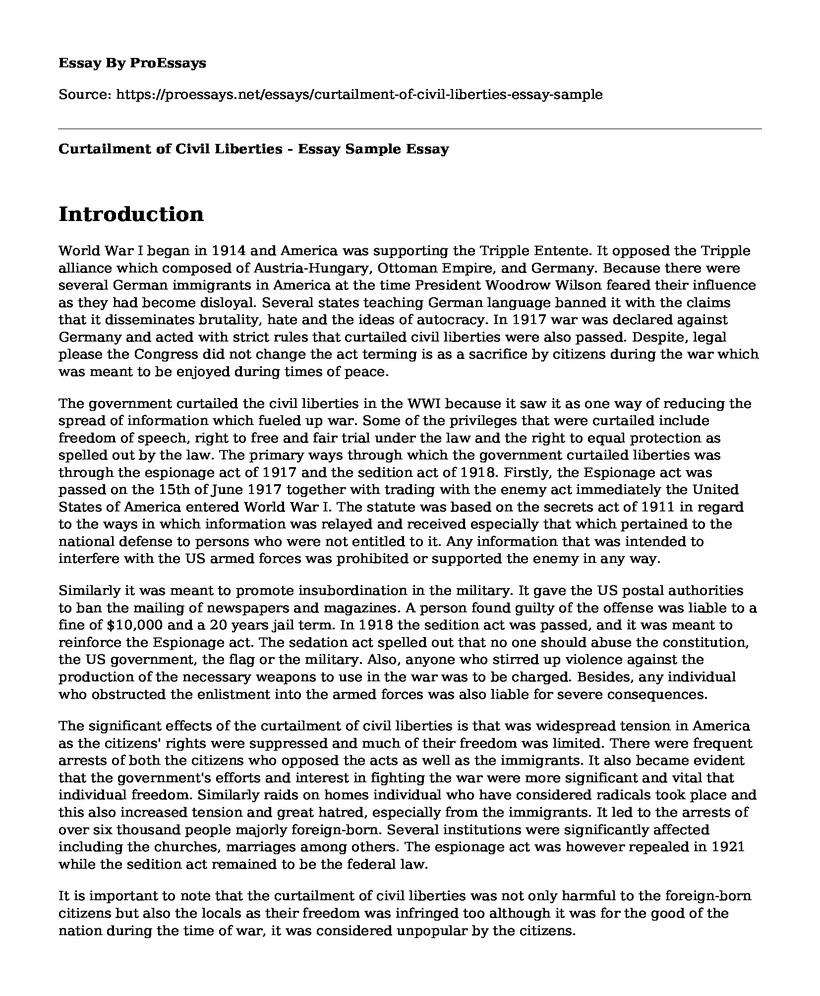Introduction
World War I began in 1914 and America was supporting the Tripple Entente. It opposed the Tripple alliance which composed of Austria-Hungary, Ottoman Empire, and Germany. Because there were several German immigrants in America at the time President Woodrow Wilson feared their influence as they had become disloyal. Several states teaching German language banned it with the claims that it disseminates brutality, hate and the ideas of autocracy. In 1917 war was declared against Germany and acted with strict rules that curtailed civil liberties were also passed. Despite, legal please the Congress did not change the act terming is as a sacrifice by citizens during the war which was meant to be enjoyed during times of peace.
The government curtailed the civil liberties in the WWI because it saw it as one way of reducing the spread of information which fueled up war. Some of the privileges that were curtailed include freedom of speech, right to free and fair trial under the law and the right to equal protection as spelled out by the law. The primary ways through which the government curtailed liberties was through the espionage act of 1917 and the sedition act of 1918. Firstly, the Espionage act was passed on the 15th of June 1917 together with trading with the enemy act immediately the United States of America entered World War I. The statute was based on the secrets act of 1911 in regard to the ways in which information was relayed and received especially that which pertained to the national defense to persons who were not entitled to it. Any information that was intended to interfere with the US armed forces was prohibited or supported the enemy in any way.
Similarly it was meant to promote insubordination in the military. It gave the US postal authorities to ban the mailing of newspapers and magazines. A person found guilty of the offense was liable to a fine of $10,000 and a 20 years jail term. In 1918 the sedition act was passed, and it was meant to reinforce the Espionage act. The sedation act spelled out that no one should abuse the constitution, the US government, the flag or the military. Also, anyone who stirred up violence against the production of the necessary weapons to use in the war was to be charged. Besides, any individual who obstructed the enlistment into the armed forces was also liable for severe consequences.
The significant effects of the curtailment of civil liberties is that was widespread tension in America as the citizens' rights were suppressed and much of their freedom was limited. There were frequent arrests of both the citizens who opposed the acts as well as the immigrants. It also became evident that the government's efforts and interest in fighting the war were more significant and vital that individual freedom. Similarly raids on homes individual who have considered radicals took place and this also increased tension and great hatred, especially from the immigrants. It led to the arrests of over six thousand people majorly foreign-born. Several institutions were significantly affected including the churches, marriages among others. The espionage act was however repealed in 1921 while the sedition act remained to be the federal law.
It is important to note that the curtailment of civil liberties was not only harmful to the foreign-born citizens but also the locals as their freedom was infringed too although it was for the good of the nation during the time of war, it was considered unpopular by the citizens.
Works Cited
Newton-Matza, Mitchell. The Espionage and Sedition Acts: World War I and the Image of Civil Liberties. Routledge, 2017.
Scheiber, Harry N. The Wilson Administration, and Civil Liberties, 1917-1921. Quid Pro Books, 2013.
Cite this page
Curtailment of Civil Liberties - Essay Sample. (2022, Dec 01). Retrieved from https://proessays.net/essays/curtailment-of-civil-liberties-essay-sample
If you are the original author of this essay and no longer wish to have it published on the ProEssays website, please click below to request its removal:
- Essay Sample on Morals of Slavery
- The Head Start Policy Program Evaluation Paper Example
- Essay Example on John Snow: A Man Who Changed the World Through His Contributions
- Essay Example on Michael Faraday: 19th Century Chemist & Physicist
- Government Handling of Genetic Information: Developing a Policy for Antisocial Behaviour - Essay Sample
- Anti-Chinese Sentiment and the 1870s Press: Expelling Chinese from the US - Essay Sample
- Report Sample: Relevance of the Declaration of Independence







